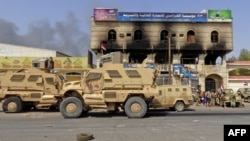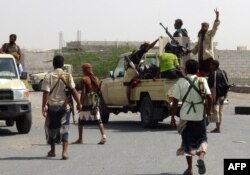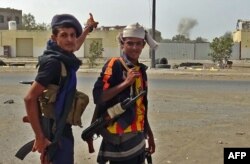Houthi rebels in Yemen are continuing to push back against Saudi-led coalition forces who are advancing on the eastern sector of the rebel-held Red Sea port of Hodeida.
The heavy Houthi resistance is keeping coalition forces bogged down in the clashes that reportedly have led to the deaths of 110 Houthis in recent days.
The heavy fighting continued as Houthi militia fighters dug into civilian and government buildings in order to slow down the advance of Saudi-coalition forces and their Yemeni allies. Saudi-owned Al Arabiya TV reported that government forces had captured the Al Rabsa district, along with former president Ali Abdallah Saleh's house and a nearby school in eastern Hodeida.
Dubai-based Sky News Arabia reported that the Houthis had blown up a mosque and demolished a number of homes, apparently to stall advances by the Saudi coalition. The news channel broadcast video of explosives and land mines it said the Houthis had placed in a number of buildings in order to blow them up, should the coalition try to capture them.
Video footage broadcast on Arab news channels showed numerous Houthis lying dead in the streets of Hodeida. The French news agency reported that the Houthis lost more than 100 men in fighting. Arab media also reported that the Houthis had moved injured fighters from Hodeida to the capital, Sana'a.
A Houthi spokesman, Mohammed al Bakhiti, said in an interview with France 24 news channel that the Saudi-led coalition forces "have not entered the city of Hodeida, but that fighting continues outside the city along the 8- and 10 kilometer-points on the highway to Sana'a." Video shown on the Arab news channels, however, refuted his claim.
Saudi-led coalition spokesman Colonel Turki al-Maliki maintained during a press conference in Riyadh Monday that the Houthis were destroying parts of the city and that civilians were ending up in the cross-fire.
He said that the internationally recognized Yemeni government of President Abd-Rabbu Mansour Hadi thinks that the Houthis are using civilians as human shields in Hodeida and fears that they may blow up parts of the city, including fuel depots, should they be driven out of the city, creating a potential ecological disaster.
Maliki also said that the Saudi coalition had asked the United States to stop refueling Saudi planes after the coalition had improved the ability to refuel on its own. The Pentagon announced last week that it would no longer help refuel Saudi planes operating inside Yemen.
The Saudi-owned Asharqalawsat newspaper reported Monday that several members in the unrecognized "government" under Houthi control in Sana'a were preparing to defect. The former information minister, Abdul Salam Jabber, in the Houthi-led cabinet in Sana'a, made a similar prediction during a recent news conference in Riyadh, following his own defection:
Jabber said he hopes that salvation will be coming soon for the Yemeni people, and that he thinks many other officials in Sana'a are preparing to defect from the Houthi side to that of the government of Hadi. He also said the Houthis were breathing their last gasps in power in Sana'a.
International NGOs, along with Houthi supporters, tweeted that children continue to starve, due to military operations by the Saudi-led coalition. Saudi-owned media broadcast video Monday of a village near Hodeida which had been captured by the coalition, showing a large number of children who appeared to be in reasonably good health. Hunger and malnutrition have, nevertheless, been reported in some villages and certain battle zones.
Many international NGOs and humanitarian groups, such as the United Nations Food and Agriculture Organization, have been warning of the mounting danger of famine inside Yemen if fighting continues. The group's head, Jose Graziano da Silva, told the U.N. last week that fighting is making the situation worse. U.N. Secretary-General Antonio Guterres also was quoted Monday as warning it would be "absolutely catastrophic" if Hodeida were destroyed.









